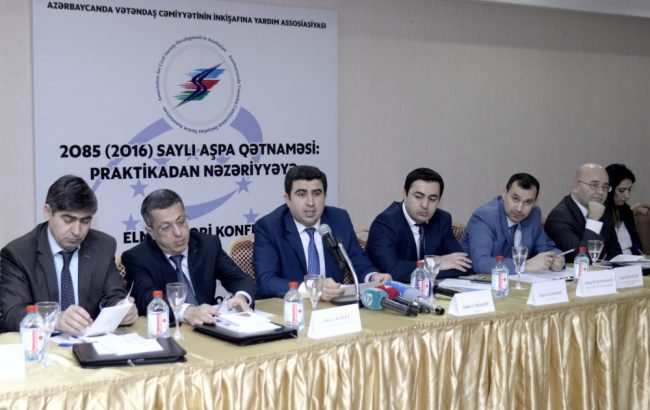
The Association for Civil Society Development in Azerbaijan (ACSDA) held a conference titled “PACE Resolution 2085: from practice to theory” in Baku Dec. 23.
The Parliamentary Assembly of the Council of Europe (PACE) has adopted a resolution (2085) on a report, titled “Inhabitants of frontier regions of Azerbaijan are deliberately deprived of water”. The report prepared by MP Milica Markovic (Bosnia and Herzegovina) was adopted at the PACE Winter Session in Strasbourg Jan. 26.
Addressing the event, ACSDA vice-president Elchin Salmanov said that the organization aims to increase the world community’s awareness of the realities of Karabakh.
He noted that one of the greatest achievements of ACSDA is the adoption by PACE of the resolution on the Sarsang reservoir, which is located in the Azerbaijani territory occupied by Armenia.
Armenia continues destroying strategic facilities in the occupied Azerbaijani territories, including the Sarsang reservoir, he added.
“Currently, the reservoir is in disrepair condition, and any emergency can endanger the lives of nearly 400,000 civilians,” Salmanov said. “In winter, Armenians release water and our districts are exposed to floods, and in summer, they stop the water flow which causes damage to agriculture.”
He added that despite Armenians’ interferences, ACSDA chairman Elkhan Suleymanov, who is also a member of the Azerbaijani parliament, repeatedly raised the issue on the Sarsang reservoir at international platforms.
“In 2014, the PACE Secretariat finally consented to beginning the work. In January of this year, a resolution was adopted in this regard,” he said, noting that this was one of Azerbaijan’s biggest victories in the past two decades.
“This issue also brings up the occupation fact. The resolution confirms the occupation of Nagorno-Karabakh and the seven surrounding districts, calling for the occupying troops to withdraw from the occupied lands,” he added.
The ACSDA vice-president said these resolutions losing their importance as long as they remain on the table, therefore, these issues must be brought up constantly.
Specialists from higher education schools and Azerbaijan National Academy of Sciences delivered speeches on ecological threats posed by possible dangers with the Sarsang reservoir, the Armenian aggression and the constant raising of these issues before the international community.
The Nagorno-Karabakh conflict entered its modern phase when the Armenian SRR made territorial claims against the Azerbaijani SSR in 1988.
A fierce war broke out between Azerbaijan and Armenia over the Nagorno-Karabakh region of Azerbaijan. As a result of the war, Armenian armed forces occupied some 20 percent of Azerbaijani territory which includes Nagorno-Karabakh and seven adjacent districts (Lachin, Kalbajar, Aghdam, Fuzuli, Jabrayil, Gubadli and Zangilan), and over a million Azerbaijanis became refugees and internally displaced people.
The military operations finally came to an end when Azerbaijan and Armenia signed a ceasefire agreement in Bishkek in 1994.
Dealing with the settlement of the Nagorno-Karabakh conflict is the OSCEMinsk Group, which was created after the meeting of the CSCE (OSCE after the Budapest summit held in Dec.1994) Ministerial Council in Helsinki on 24 March 1992. The Group’s members include Azerbaijan, Armenia, Russia, the United States, France, Italy, Germany, Turkey, Belarus, Finland and Sweden.
Besides, the OSCE Minsk Group has a co-chairmanship institution, comprised of Russian, the US and French co-chairs, which began operating in 1996.
Resolutions 822, 853, 874 and 884 of the UN Security Council, which were passed in short intervals in 1993, and other resolutions adopted by the UN General Assembly, PACE, OSCE, OIC, and other organizations require Armenia to unconditionally withdraw its troops from Nagorno-Karabakh.
